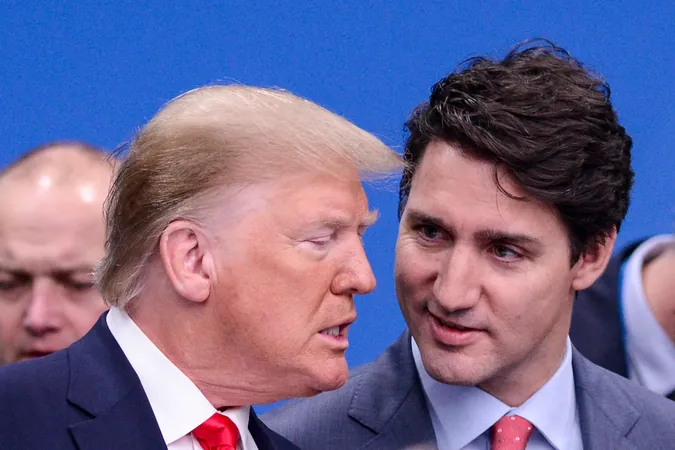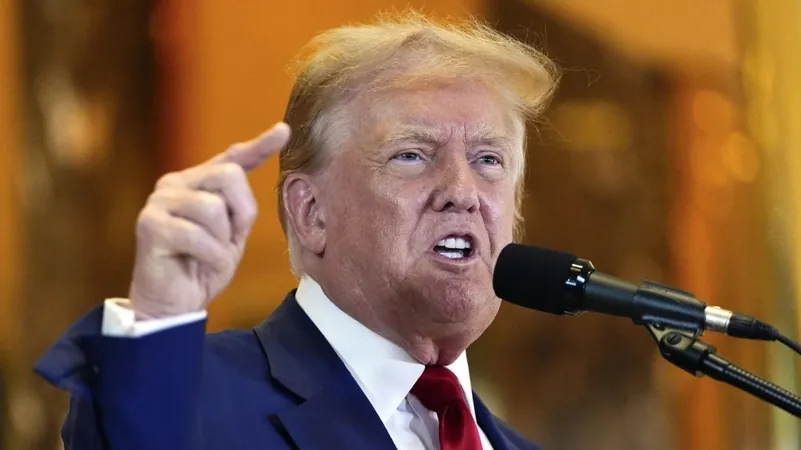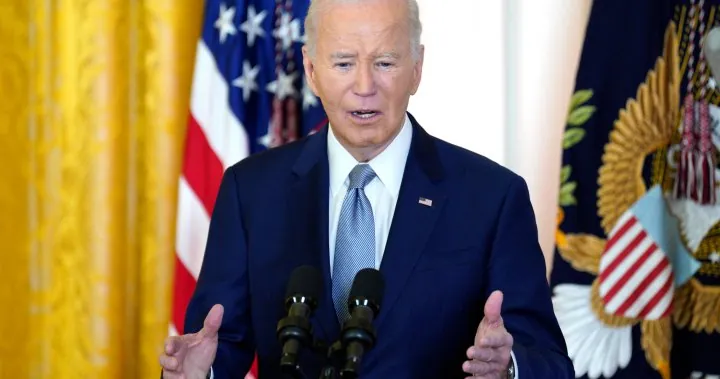
Brace for the Coming Chaos: How Canadian Investors Can Prepare for Trump's 2025 Agenda
2024-12-16
Author: Jacques
Introduction
As Donald Trump gears up for his second term, Canada finds itself bracing for potential conflicts as the former president has publicly joked about Canada becoming the 51st U.S. state. His remarks, which initially seemed humorous during a recent Thanksgiving dinner at Mar-a-Lago, are beginning to raise serious eyebrows among Canadian officials and citizens alike.
Political Reactions
Public Safety Minister Dominic LeBlanc downplayed Trump’s comments, noting they were made in jest during a light-hearted social gathering. However, Trump’s persistent fixation on the idea, complete with an AI-generated image of himself beside a Canadian flag that mistakenly portrayed the Swiss Alps as the Rockies, hints at a deeper strategy.
At a Fox News event last week, Trump further provoked his supporters to chant “Fifty-one, fifty-one, fifty-one.” Such rhetoric is not being taken lightly in Canada; despite the laughter, the implications of his comments demand attention.
Economic Implications
Looking ahead, Canada faces potential economic turbulence as Trump prepares for a return to power. As he aims to leave a lasting legacy in history, he might see exerting control over Canada’s economy as a critical part of his strategy. If he perceives economic domination of his neighboring countries as a way to achieve greatness, the impact on Canada could be severe.
With fears of economic restrictions looming, experts note that Canada’s response has been tepid and fragmented. Canadian leaders are divided on how to counter possible tariffs Trump may impose, which could potentially escalate tensions between the two nations. For instance, Ontario Premier Doug Ford has suggested cutting off energy supplies to certain U.S. states, a proposal that has been met with resistance from Alberta’s Premier Danielle Smith.
If Trump follows through on his threats to impose 25% tariffs on imports from Canada and Mexico, Canadians can expect significant repercussions. Prime Minister Justin Trudeau has hinted that Canada may retaliate with its own tariffs on select U.S. goods, such as steel and aluminum. However, any escalation could spiral into a trade war, with Canadians facing rising costs and potentially plunging into a recession.
Potential Trade War
The economic stakes are high. A trade war could lead to skyrocketing inflation driven by a declining Canadian dollar, coupled with higher prices on imports. This scenario could impact everyone, from consumers to businesses, severely disrupting the Canadian economy.
Pathway to Resolution
The key question now is whether there’s a pathway to diffuse this escalating situation. One potential avenue could be a renegotiation of the United States-Mexico-Canada Agreement (USMCA), which Trump previously championed. If all three nations face similar economic pains, there could be a mutual desire to negotiate a deal, even if it favors the U.S. Nevertheless, reaching any agreement is likely to be complex.
Investor Recommendations
So, how can Canadian investors prepare for the potential upheaval ahead? Experts recommend proactive measures including taking profits, particularly from export-oriented sectors, and holding investments in U.S. dollars to hedge against possible declines in the Canadian economy. One sensible investment to consider is the iShares 0-5 Years TIPS Bond Index ETF, which has shown resilience and currently enjoys a positive year-to-date return.
Conclusion
In summary, with a tumultuous future likely looming under Trump's agenda, Canadian investors are urged to stay vigilant, adapt quickly to market changes, and take strategic actions to safeguard their financial health in the face of impending chaos. The next years promise to be unpredictable, and preparation is essential.









 Brasil (PT)
Brasil (PT)
 Canada (EN)
Canada (EN)
 Chile (ES)
Chile (ES)
 España (ES)
España (ES)
 France (FR)
France (FR)
 Hong Kong (EN)
Hong Kong (EN)
 Italia (IT)
Italia (IT)
 日本 (JA)
日本 (JA)
 Magyarország (HU)
Magyarország (HU)
 Norge (NO)
Norge (NO)
 Polska (PL)
Polska (PL)
 Schweiz (DE)
Schweiz (DE)
 Singapore (EN)
Singapore (EN)
 Sverige (SV)
Sverige (SV)
 Suomi (FI)
Suomi (FI)
 Türkiye (TR)
Türkiye (TR)